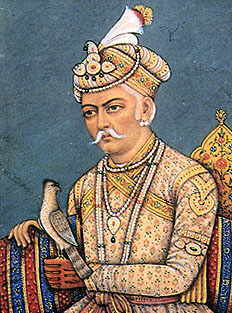| AKBAR
THE GREAT
Akbar is
considered the greatest of Mughals, and his
achievements are many. Perhaps his greatest
accomplishment was to bring Hindus and Muslims
together. Akbar transformed the predominantly
alien character of the nobility by incorporating
Rajput princesses into this select group. He
entered into matrimonial alliances with
distinguished Rajput clans and allowed his wives
to follow their own customs and religion. Akbar
inspired and encouraged other nobles to be
tolerant.
Although
Akbar's own education had been disrupted by the
accidental death of his father, Humayun (1566),
and the difficulties that plagued him in its wake,
however, this did not inhibit him from taking a
keen interest in literary and intellectual
discourses. He was generous in patronizing men of
talent ranging from music to metaphysics. Most
illustrious among these were referred to as the
Navratna - the nine gems. These included Tansen
the legendary musician and Rahim the poet. He
encouraged a lively exchange of ideas and refused
to accept the primacy of religious dogma. A devout
 Muslim,
he tried to encourage communal harmony by
propagating Din e Ilahi - a fraternity of goodwill
and tolerance which proclaimed respect for all
religions. Muslim,
he tried to encourage communal harmony by
propagating Din e Ilahi - a fraternity of goodwill
and tolerance which proclaimed respect for all
religions.
The most
important administrative innovation introduced by
Akbar was the Mansabdari system (1577) that put
every official of the state on the army rolls,
irrespective of his duties. And every official,
from the lowest to the highest, was paid by the
imperial department of the army. This greatly
tightened the central control over the bureaucracy
and the army. The system of transfer of officials
was rigorously implemented.
Akbar built
the city of Fatehpur Sikri near Agra, and though
it never could replace the imperial capital, the
buildings there reflect the grand vision and the
catholic taste of the man who commissioned them.

|